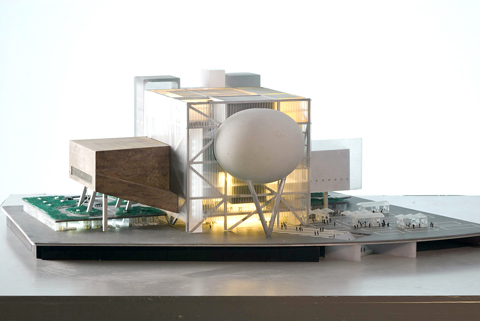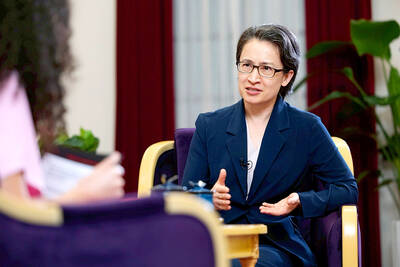Several years ago, German architect Ole Scheeren and Dutch architect Rem Koolhaas made a splash when they unveiled their bold design for the China Central Television Tower and Television Cultural Center in Beijing.
A building with their signature design will soon appear in Taipei after the architects won an international bid in January to build the Taipei Performing Arts Center. And the Taipei City Government is hoping the big names will help boost the city’s international profile.
Shaped like a cube with a protruding sphere on one side, the building uses the concept of a Rubik’s Cube and its rotation, and is expected to become a landmark upon completion in 2014.

PHOTO COURTESY OF TAIPEI CITY’S DEPARTMENT OF CULTURAL AFFAIRS
The center will be located across from Jiantan MRT Station, near the Shilin night market.
Presenting a scale model of the building earlier this month in Taipei, Scheeren said the density and vitality of the Shilin night market was the main inspiration for the design, adding that he expected the arts center to blend into the area and become a space for theatergoers and others.
“[The concept of the building] includes the density of the night market, the traffic and even the smell of the food. It suggests the coexistence of two different cultures simultaneously, low culture and high culture,” he said.
The arts center will house a 1,500-seat theater and two 800-seat theaters on a 2.2-hectare plot and will serve as a venue for major, long-running performances.
Taipei Mayor Hau Lung-bin (郝龍斌) compared the arts center to the Sydney Opera House in Australia and said he hoped the building would boost the city’s profile and attract tourists.
With the aim of improving Taipei’s aesthetic appeal, the city government has been trying to attract world-renowned architects to design buildings that make statements.
To build the Taipei Performing Arts Center, the city government held an international design competition for the project last year, inviting Mohsen Mostafavi, dean of the Graduate School of Design at Harvard University, to head the selection committee.
The budget for the building was more than NT$4.5 billion (US$133 million), about 15 percent of which went to the architecture firm.
Hau said the city government was willing to invest in innovative architecture.
“We want the best team and we would rather spend some money to make these new buildings great assets for the city,” he said.
The Taipei Songshan Tobacco Culture Park is another project that will be carried out by an internationally renowned architecture firm.
Toyo Ito, one of the most influential architects in Japan, was commissioned to design a 1.2-hectare building in the park, which will be situated on the abandoned 7.2-hectare Tobacco Plant site in Xinyi District (信義).
Part of the project’s NT$8.6 billion budget will be used for new construction, but another part will be used to restore historical buildings at the plant, while an indoor sports dome will be built next to the park, the Taipei City Department of Cultural Affairs said.
Department Commissioner Lee Yong-ping (李永萍) said the building would serve as an innovative venue with multiple uses including a shopping area, hotel and recreational space for the public, helping transform the old plant into a vital cultural landmark in the city.
The city government will also invite international architectural teams to design two other cultural facilities, the Taipei Pop Music Center and the Taipei City Museum, she said.
Some environmental groups, however, have expressed concern about the environmental impact of the projects.
The Tobacco Culture Park project met with opposition from the Green Party and other environmentalists, who accused the city government of dodging an Environmental Impact Assessment and removing hundreds of old trees from the site to make way for construction.
Some also challenged the large investments required for the projects, as many facilities, such as the Ketagalan Culture Center of Taipei City’s Indigenous Peoples Commission in Beitou (北投), are rarely used.
Lee cited the example of the Taipei Performing Arts Center to defend the city government’s efforts, saying it would help solve the long-term problem of the lack of theaters on a par with the National Theater and National Concert Hall.
The department said it expected the center to attract more than 1 million visitors each year and start turning a profit within five to six years.

Temperatures in northern Taiwan are forecast to reach as high as 30°C today, as an ongoing northeasterly seasonal wind system weakens, the Central Weather Administration (CWA) said. CWA forecaster Tseng Chao-cheng (曾昭誠) said yesterday that with the seasonal wind system weakening, warmer easterly winds would boost the temperature today. Daytime temperatures in northern Taiwan and Yilan County are expected to range from 28°C to 30°C today, up about 3°C from yesterday, Tseng said. According to the CWA, temperature highs in central and southern Taiwan could stay stable. However, the weather is expected to turn cooler starting tonight as the northeasterly wind system strengthens again

The Ministry of Foreign Affairs (MOFA) yesterday expressed “grave concerns” after Singaporean Prime Minister Lawrence Wong (黃循財) reiterated the city-state’s opposition to “Taiwanese independence” during a meeting with Chinese Premier Li Qiang (李強). In Singapore on Saturday, Wong and Li discussed cross-strait developments, the Singaporean Ministry of Foreign Affairs said in a statement. “Prime Minister Wong reiterated that Singapore has a clear and consistent ‘one China’ policy and is opposed to Taiwan independence,” it said. MOFA responded that it is an objective fact and a common understanding shared by many that the Republic of China (ROC) is an independent, sovereign nation, with world-leading

COOLING OFF: Temperatures are expected to fall to lows of about 20°C on Sunday and possibly 18°C to 19°C next week, following a wave of northeasterly winds on Friday The Central Weather Administration (CWA) on Sunday forecast more rain and cooler temperatures for northern Taiwan this week, with the mercury dropping to lows of 18°C, as another wave of northeasterly winds sweeps across the country. The current northeasterly winds would continue to affect Taiwan through today, with precipitation peaking today, bringing increased rainfall to windward areas, CWA forecaster Liu Pei-teng (劉沛滕) said. The weather system would weaken slightly tomorrow before another, stronger wave arrives on Friday, lasting into next week, Liu said. From yesterday to today, northern Taiwan can expect cool, wet weather, with lows of 22°C to 23°C in most areas,

DEFENDING FREEDOM: Taiwanese love peace and helping others, and hope to be a positive force in the world, Vice President Hsiao Bi-khim told ‘Weltspiegel’ Taiwan is making every effort to prevent war in the face of China’s hybrid coercion tactics and military threats, Vice President Hsiao Bi-khim (蕭美琴) said in an interview with German public broadcaster ARD’s program Weltspiegel that aired on Monday. Taiwan is not seeking provocation or intending to disrupt international order, but “must possess the capacity for self-defense,” a news release issued by the Presidential Office yesterday quoted her as saying. Taiwan is closely watching not only the increasing scope and frequency of Chinese military exercises around the nation, but also Beijing’s hybrid and cognitive warfare tactics, including manipulating public opinion, fostering